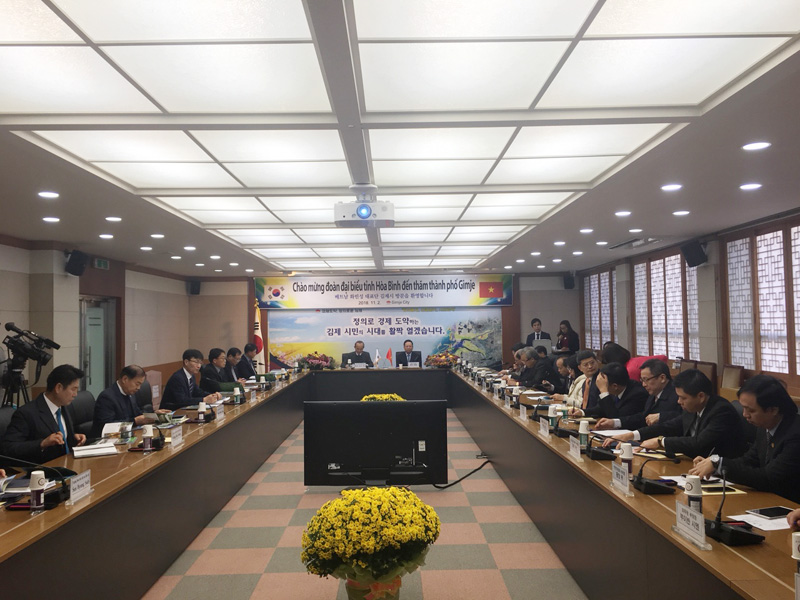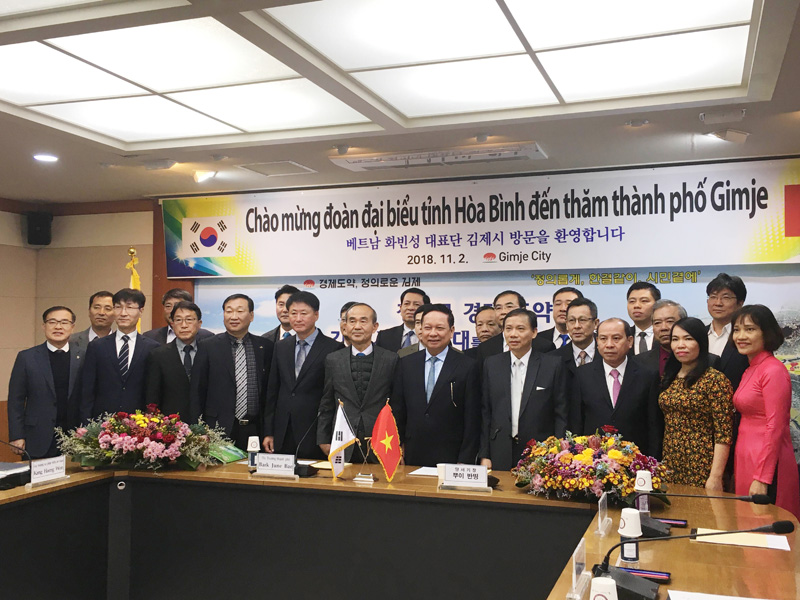
(HBO) – Leaders of Hoa Binh province held talks with their counterparts of Gimje city of the Republic of Korea (RoK)’s Jeollabuk-do province on November 2 to discuss bilateral cooperation towards the signing of a cooperative agreement between the two localities.
Attending the talks in Gimje city were Mayor of Gimje Park
Joon-bae, and representatives from the city’s divisions and offices; and Bui
Van Tinh, member of the Communist Party of Vietnam Central Committee and
Secretary of the provincial Hoa Binh Party Committee; Hoang Van Tu, Vice
Chairman of the provincial People’s Council; Bui Van Khanh, Vice Chairman of
the People’s Committee; Hoang Minh Tuan, head of the provincial Party Committee’s
Organisation Commission, along with representatives from several departments
and sectors of Hoa Binh province.
At the event, the two sides introduced each other to their
respective locality’s socio-economic situation and development potential. Hoa Binh
has advanatages in agricultural development with such main crops as citrus
fruits, industrial crops and farm produce. Meanwhile, Jeollabuk-do owns
plentiful agricultural products, and has a developed cuisine culture and food
industry. It is also a cradle of traditional cultural arts where the RoK’s
traditional cultural heritage is kept almost intact.

Photo: High-level talks between
Hoa Binh province (Vietnam) and Gimje city, Jeollabuk-do, the Republic of Korea.
Addressing the event, Bui Van Tinh, member of the Communist Party
of Vietnam Central Committee and Secretary of the provincial Party Committee,
thanked leaders of Gimje city for their warm and kind welcome.
The talks and discussions towards the signing of the bilateral
cooperation agreement will help boost socio-economic development and
people-to-people exchanges between the two localities, thereby helping to consolidate
the fine development between Vietnam and the RoK.
Both sides agreed to focus cooperation on the following fields:
1. Strengthen collaboration in science and technology.
2. Exchange experiences and transfer technology in agriculture:
produce, process and preserve vegetables and fruits; preserve post-harvest
agricultural products; produce plant varieties; plant and develop forest trees;
develop hi-tech agriculture; develop technologies to improve land and treat
animal waste; develop aquatic farming and processing; develop herbal plants.
3. Support investment promotion, canvass of official development
assistance (ODA) and other aid sources.
4. Intensify personnel exchange and cooperation between training establishments,
and support high-quality human resources training between the two sides.
5. Support collaboration in tourism, organise cultural and sport
exchanges.
6. Other cooperation fields will be implemented following their
leaders’ consensus.

Photo: High-ranking leaders of Hoa
Binh province and Gimje city
After the talks, the high-ranking delegation of Hoa Binh province
visited an integrated control centre, an agriculture equipment and machinery
production factory, Ha Rang hi-tech agricultural zone, Samankum and Daesung
companies.
On the morning of November 3, the delegation had a working session
with representatives of several RoK enterprises in Seoul capital city before
concluding its working visit to the RoK./.
Hoa Binh province is undergoing a dynamic transformation amid Vietnam’s national digital transition. Building on Poliburo’s Resolution No. 57-NQ/TW on breakthroughs in science, technology, innovation, and national digital transformation, the province has rolled out a wide range of practical action plans. A standout initiative is the "Digital Literacy for All” movement, an effort to ensure that no one is left behind in the digital era.
Hoa Binh province is undergoing a dynamic transformation in the wake of the national digital transformation movement. Building on Resolution No. 57-NQ/TW of the Politburo on breakthroughs in science, technology, innovation, and national digital transformation, the province has implemented a wide range of practical action plans. A standout initiative is the "Digital Literacy for All” movement ambitious effort to ensure that no one is left behind in the digital age.
With a spirit of unity and proactive problem-solving, the Party Committee, the government and the people of Dong Lai Commune (Tan Lac District) have made great strides in implementing the resolutions of the 24th Party Congress of the commune for the 2020 - 2025 term. Focusing on leadership and practical actions, the commune has brought the Party’s resolutions into daily life, creating strong impacts and pushing the local development forward.
Amid the nationwide push for digital transformation, young people in Hoa Binh Province are stepping up as dynamic pioneers, applying technology to enhance Youth Union operations and expand the reach of youth-led initiatives. Through creativity and adaptability, Youth Union organizations at all levels have introduced a series of practical solutions, contributing to modern governance and community development.
In recent years, An Nghia commune, located in Lac Son district, has stepped up administrative reform, focusing on improving the quality and efficiency of its single-window service unit for receiving and processing administrative procedures. These improvements have helped create favourable conditions for local residents and organisations to handle administrative procedures, contributing to the commune’s broader socio-economic development.
The Prime Minister-approved master plan to develop the multi-use value of forests ecosystems through 2030, with a vision to 2050, aims to improve the management and sustainable use of forest resources, create jobs, increase incomes, and improve the living standards of ethnic minorities, people in mountainous and remote areas, forest workers and those living near forests.




